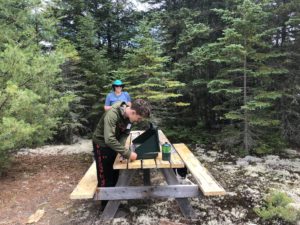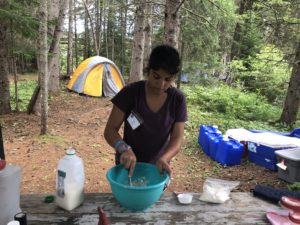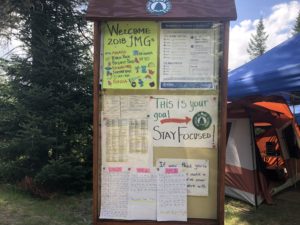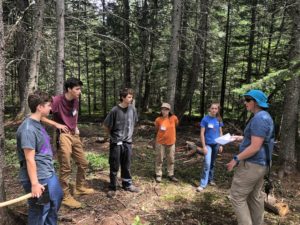At Junior Maine Guide Testing Camp 64 Campers Demonstrate Skill, Knowledge
Half a dozen teenagers are gathered on the shore of the Kennebago River. They are buckling and adjusting the straps of their lifejackets, examining a selection of paddles spread out on the ground, and pacing a little nervously as they look out on the water. Among them is 14-year-old Noah from Maryland, a camper at Birch Rock Camp in Waterford.
Noah, along with 63 other teens from nine different Maine camps, participated last week in the annual five-day Junior Maine Guide Testing Camp, held for the past several years at the Stephen Phillips Memorial Preserve in Oquossoc. Fourteen-year-old Noah was making his first attempt last week at JMG certification, which candidates earn after successfully passing a series of practical and written tests in outdoor living skills. Paddle in hand, he was waiting for his turn to climb into a canoe with a JMG examiner and show his stuff.

“I’m a little nervous,” Noah said. “I have the strokes down; it’s just the questions.”
At his encampment, though, Noah said things had gone well. “The cooking is going great,” he said. “Last night we had grilled cheese and tomato soup, and for breakfast we had crepes. At lunch we had reubens.”
Despite the nerves, Noah and other JMG candidates who gathered last week agreed that testing camp – and the quest to become a JMG – offered all they had hoped for. The candidates set up and lived in their four-person encampments, cooked three meals a day, and were evaluated in everything from axe and knife skills, to building a wet-day fire, to tree identification. Last Tuesday afternoon, at a picnic table next to a trailer stowing JMG staff supplies, examiners K Bolduc and Jeremy Holden quizzed candidates on map and compass use. Nearby, sitting on logs in shade of brightly colored tarps hanging above, candidates crouched over papers taking a variety of written tests.
Across the large encampment, tucked into a forested area, examiner Katie Curtis, a long-time JMG tester and daughter of JMG Director Moose Curtis, addressed to a handful of candidates preparing to take their axe test. One of those candidates was Jovina, a Massachusetts teen who had spent the past three weeks at Bryant Pond 4-H Camp. A few minutes later, Jovina had unsheathed her axe and was delimbing a branch, splitting a log, and wielding a knife to create wood shavings. After the test – results wouldn’t come until week’s end – she talked about her JMG experience.

“My family has a home near Bethel; that’s how I found out about Bryant Pond,” she said. “It’s a really great camp. I love all the counselors, and the campers are great. I want to be a counselor.”
Jovina, who was at JMG testing camp for the first time, said the Bryant Pond JMG training program was particularly rigorous. Candidates live in their own encampment apart from the Bryant Pond main campus, she said. “Any time we’re not making meals or packing out [supplies], we’re studying,” she said. When she was given the JMG resource book, The Art of Outdoor Living, she said “I picked up that book and I was like, ‘what do I do, memorize it?’ and they were like ‘yeah, pretty much.’”
But a couple of days into testing camp, she said things were going well. “It’s not as stressful as I imagined it,” she said, “I thought it was going to be complete chaos, with 10-page tests and essays. It’s more manageable than I thought.”
Camp Kawanhee, a boys’ camp on Webb Lake in Weld, sent 10 campers to test camp. Among them was Giancarlo, 15, a fifth year camper from Puerto Rico. Villaverde said camp was offering “recuperation from the hurricane,” adding that “we do a lot of great things.”
“JMG has opened doors for a lot of people,” Giancarlo said as he helped a trio of campmates clean up from their burger and fries lunch effort. “Before, I couldn’t swing an axe for my life. Now I feel pretty confident in my axe skills.”

Fellow Kawanhee camper Ethan, 15, in his eighth year at the camp, said his favorite part of JMG camp was “All of it. The meals, and the food is so much better.” Ethan acknowledged that the testing “definitely has some stressful parts, but overall it’s super fun to show off your knowledge.
Four girls represented Camp Runoia, a girls’ camp in Belgrade. Among them was Ashna, 15, from Natick, Massachusetts. “I was so, so excited to come here,” she said. “I love the fact that we’re at a campsite by ourselves, without counselors, and we have to sustain ourselves.”
“It helps you feel a little more independent,” Ashna said. “We have to manage our own time and make our own meals and stuff.”
Lilly, 16, from Needham, Massachusetts, agreed. “I like the independence side of JMG.”
“We have to manage our own time, and fit in times for collecting firewood and choose when we take tests,” Lilly said. “There’s a lot of independence.”
The Girl Scouts of Maine’s Camp Natarswi, at the foot of Mt. Katahdin, also has an active JMG program. Among Camp Natarswi’s candidates was Adeline, 15, of Brunswick. As she rinsed lunch dishes – after serving chicken Caesar over noodles, with s’mores dip for dessert – Adeline said the Map of Area of test would be among the most challenging. “You have to be really accurate, like only have half a degree of error of closure.”

Another Natarswi camper, Maya, hails from Dallas, Texas, but has spent summers with her grandparents in Lincoln, Maine. At age nine she began attending Natarswi. “I love it,” she said. As for JMG, her favorite skill is swinging an axe. “It’s intense, but fun,” she said. The biggest challenge? “Map of Maine, because I’m not from Maine,” she said. “But I’m working hard on it.”
Across the board, candidates at 2018 testing camp worked hard and seemed to appreciate the program, said JMG Director Moose Curtis. Moose Curtis, who has served as director for 41 years, oversees a testing staff of 13 skilled outdoors enthusiasts, which also includes his daughter Carrie. Many of them were certified as JMGs themselves, and as long-time JMG examiners they travel from all over the country each July to collaborate in administering and grading tests taken by new groups of candidates.
According to Curtis, this year’s group had a passing rate of 53.1 percent. Most candidates making their second attempt at certification were successful, he said (20 of 24), while only 14 of 40 first-year candidates passed. The group also benefited from evening speakers, including outdoors advocates, Border Patrol agents, and a Master Maine Guide.
The Junior Maine Guide program benefits from a long history, skilled instructors, and enthusiastic supporters. Established in 1937, the program is a joint effort of the non-profit camp organization Maine Summer Camps and the Maine Department of Inland Fisheries and Wildlife. At camps across the state, counselors train youngsters in these outdoor living skills so that they may one day become registered trip leaders, pursue outdoor activities into adulthood, even become Maine Guides. At 2018 testing camp, candidates invested their knowledge, energy, and enthusiasm for wilderness living. As they gathered last week, many said the effort of training and testing could reap the obvious benefit of JMG certification. Skills and a new-found confidence, however, just might transcend the question of a passing grade.